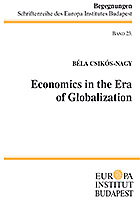 Begegnungen
Begegnungen
Schriftenreihe des Europa Institutes Budapest
Band 23.
Béla Csikós-Nagy
Economics in the Era of Globalization
Budapest 2005
Europe Institute Budapest • Social Research Center of HAS
Translated by Ildikó VÁRKONYI
Proof-read by Tamás BÁCSKAI
This book was prepared in cooperation with and supported
by the National Programme for Strategic Research
The publication was financially supported by
the Pro Renovanda Cultura Hungariae Foundation
the Aktion Österreich Ungarn Foundation
MOL Hungarian Oil Corporation
OTKA (National Scientific Research Fund)
and by the Social Research Center of the Hungarian Academy of Sciences
ISBN 963 21843 7 8
ISSN 1416 3055
CONTENTS
|
Introduction
|
9
|
|
CHAPTER 1 • THE HISTORICAL ROOTS OF ECONOMICS
I. Categories of the Economy
1. Barter Economy
2. Commodity Economy
3. Enterprise
II. The Driving Forces of Economy
1. The Ethical-Religious Outlook on Life
2. The Spread of Materiality in Europe
|
15
15
26
33
40
40
45
|
|
CHAPTER 2 • WORLD EXPLANATION AND ECONOMICS
I. Major Trends in Economics
1. The Role of Science in Social Progress
2. Pure Economic Theory
3. Ideology Determined Economics
II. The Historical Background of the Establishment of Economics
1. The Leading Role of Great Britain
2. Classical Economics
|
55
55
61
68
75
75
79
|
|
CHAPTER 3 • THE THESES OF CLASSICAL ECONOMICS
I. The Scope and the Major Operating Principles of Economy
1. Increasing National Wealth
2. The Law of Labor Value
3. Price Automatism
II. Economic Policy: Equilibrium, Growth and Wealth
1. The Economic Organizing Function of the State
2. Equilibrium of the National Economy
3. Switch to Distribution by Need
|
89
89
97
114
136
136
148
162
|
|
CHAPTER 4 • CRISIS OF CLASSICAL ECONOMICS
1. Widening of the Development Gap
2. Deteriorating Natural Living Conditions
3. The Money Revolution
4. First and Second Economies
|
171
183
191
201
|
|
CHAPTER 5 • WORLD ORDER AND ECONOMIC GLOBALIZATION
I. Modernization and Culture
1. Civilizations
2. Cultural Values
3. General Equilibrium
4. Economic Globalization
|
211
211
222
229
239
|
|
CHAPTER 6 • THE INTEGRATION OF NATURE, SOCIETY AND THE ECONOMY
1. Economics of the Public Sector
2. Environmental Economics
3. The Three Dimensions of Economics
|
251
269
280
|
|
CHAPTER 7 • THE STATE DISTRIBUTION SYSTEM
1. The Welfare of the Population
2. State Redistribution of Incomes
3. Economics of the Military Sector
4. Economics of Education
5. Economics of Health
|
299
314
319
329
343
|
|
CHAPTER 8 • ECONOMIC INTEGRATION OF STATES
I. Integration of States in the World Economy
1. The Main Features of World Economy
2. The World Economy and Regional Integrations
3. Four Large Integrations and their Historical Roots
II. The European Union
1. The Coordinated Economic Policy
2. The European Monetary Union
III. The Economic Strategy of the Developing World
1. Self-Relying Global Strategy
2. The OPEC Strategy
|
359
359
363
375
383
383
387
391
391
399
|
|
CHAPTER 9 • INTERNATIONAL PRODUCTION
1. National Capital – Shortage and Surplus
2. International Production and the National Economic Policy
3. National and International Economic Policy
4. The Weight of International Production in World Economy
|
403
410
416
419
|
|
CHAPTER 10 • GLOBALIZED ENVIRONMENTAL POLICY
I. International Coordination of Environmental Policies
1. Criticism of the Social Market Economy
2. The Role of the UN in the Preservation of Our Natural Environment
II. Major Issues of Environmental Protection
1. Protection of the Atmosphere
2. Combating Deforestation
3. Conservation of Biological Diversity
|
427
427
431
441
441
449
452
|
|
CHAPTER 11 • NEW LAWS OF COMMODITY AND MONEY RELATIONS
I. Information Society
1. The World Wide Web of Information
II. New Foundations of the Monetary Theory
1. The Globalized Capital Market
2. The Money Product
|
461
461
471
471
478
|
|
CHAPTER 12 • ECONOMICS OF THE TWENTY FIRST CENTURY
I. Sustainable Social Development
1. New Foundations for Economic Growth
2. Environment-Friendly Technologies
II. The New World Economic Order
1. Critical Issues of the Economy
2. World Economic Equilibrium
III. Institutions of the Economy
1. Organization of the National Economy
2. The Organization of the Word Economy
IV. Multi-Cultural Economics
|
489
489
497
516
516
526
533
533
541
551
|
|
Index
|
557
|
 Begegnungen
Begegnungen